Tulsi Gabbard ends long-shot 2020 bid, throws support to Joe Biden
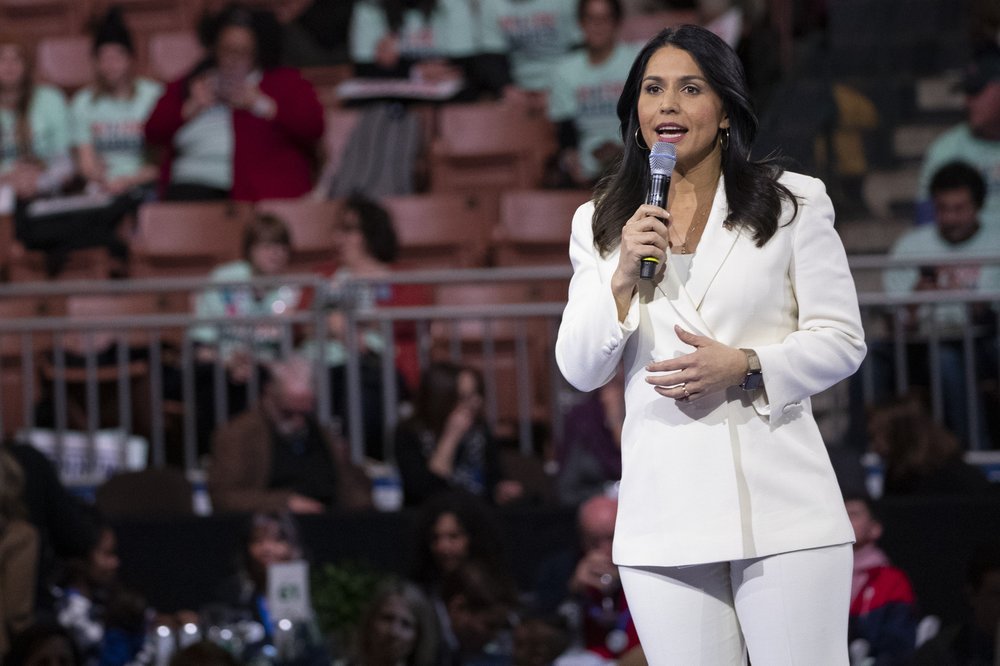
Tulsi Gabbard offered her full support to former Vice President Joe Biden.
Iran Strikes Back at US with Missile Attack at Bases in Iraq

Iranian state TV said it was in revenge for the killing of Revolutionary Guard General Qassem Soleimani.
Poll: Americans expect Russia tension will get worse
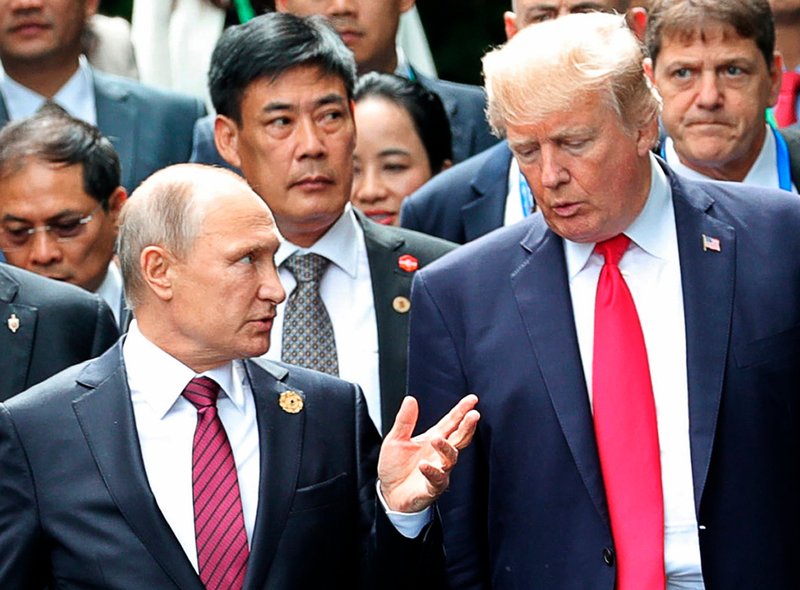
Americans largely fear the country’s relationship with Russia and China will get worse in the coming year, and despite signs of diplomatic progress with Kim Jong Un on nuclear weapons, nearly half say the same about North Korea. That’s according to a new poll from The Associated Press-NORC Center for Public Affairs Research (AP-NORC) that provides insight into the public’s view on the direction of U.S. ties with those key strategic rivals, 15 months after President Donald Trump took office. “Trump has opened up a whole bucket of worms, and he’s doing it with too many countries all at once,” said John Parker, 70, of Fort Lauderdale, Florida. “It’s almost like he’s trying to get us into trouble.” The poll found that Americans are most downbeat about the relationship with Russia: 56 percent think it will get worse over the next year, while just 13 percent think it will improve. Even among Republicans, more expect the relationship with Russia to get worse than better, 40 percent to 20 percent, though another 40 percent expect it to stay about the same. Eric Brammer, 30, an information technology specialist from Roanoke, Virginia, who describes himself as Democrat, said he expects tensions to continue over Russia’s support of the government of President Bashar Assad in civil war-wracked Syria, where the U.S., Britain and France last week launched missile strikes against Syrian chemical weapons facilities. Brammer also said that if more allegations of Russian interference in U.S. elections come to light, it will sow more distrust among the American public and worsen the relationship. On China — with which Trump has forged cooperation against North Korea but drawn sharp differences on trade — some 48 percent expect relations to get worse in the next year, while just 17 percent expect things to get better. “The farmers here are worried about trade with China because of the soybeans, corn and hogs that all go there,” said Dorothy Jorgensen, a retiree from Sioux Falls, South Dakota, who expects relations with the world’s second-largest economy to deteriorate. “If one side raises taxes and the other side does the same, it’s not going to help either country.” As Trump looks to narrow the U.S. trade deficit, he has threatened to raise U.S. tariffs on up to $150 billion of Chinese goods to counteract what he says are that country’s unfair trade policies. That has fueled fears of a trade war. China has threatened to retaliate with tariffs of its own, including on American agricultural produce. But Marta Vicentini, a retired neurophysiologist from Miami Beach, Florida, said Trump was right to hit back against China over theft of U.S. know-how and trade secrets and predicted his strategy would work in America’s favor. “They (China) have no alternative but to trade with the U.S.,” she said. Vicentini also supports the Republican president’s approach toward North Korea. She said the imposition of sanctions is paying off and the young dictator Kim has been brought to the table by fears Trump will resort to military force and even a nuclear strike. “He (Kim) is going to grow up and mature and he’s going to realize that he’s playing with fire,” Vicentini said. Trump is planning to meet with Kim by June, in search of a deal in which North Korea would give up his nuclear weapons. It would be the first U.S.-North Korea summit after six decades of hostility since the Korean War. Despite the promise of the summit, far more Americans think relations with the North Korea will get worse than better, 47 percent to 20 percent. Republicans are more optimistic. Forty percent think that the relationship that grew increasingly tense last year will improve in the next year. Some 34 percent think it will stay about the same, and just 25 percent expect it to worsen. Outside of foreign affairs, 40 percent of Americans approve of the overall job Trump is doing as president, the poll found. That’s about the same percentage as said so a month ago, up slightly from where it’s been for most of the year. Fifty-nine percent now say they disapprove of the job the president is doing. Americans are also largely pessimistic about the state of the country generally. Sixty percent think the U.S. is headed in the wrong direction, though a majority of Republicans — 67 percent — think it’s headed the right way. The AP-NORC poll of 1,140 adults was conducted April 11-16 using a sample drawn from NORC’s probability-based AmeriSpeak Panel, which is designed to be representative of the U.S. population. The margin of sampling error for all respondents is plus or minus 4.0 percentage points. Respondents were first selected randomly using address-based sampling methods, and later interviewed online or by phone. The following graph shows results from the AP-NORC Center poll: Graphic shows results of AP-NORC Center poll on foreign relations and Trump approval. [Photo Credit: AP Photos]Republished with the permission of the Associated Press.
Donald Trump, Vladimir Putin look to work together on Syria
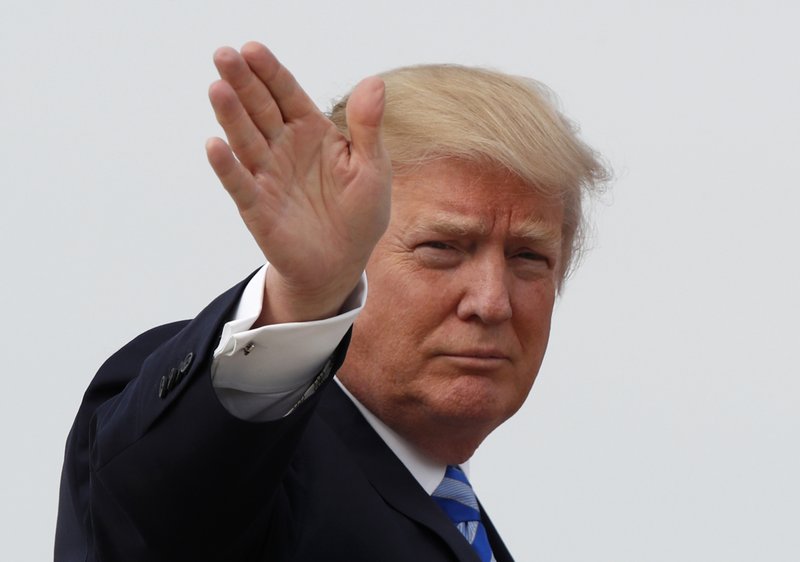
President Donald Trump and Russian President Vladimir Putin signaled improving prospects for cooperation in Syria in what the White House called a “very good” phone discussion that included a focus on setting up safe zones in the war-torn nation. The Kremlin said the leaders also agreed in Tuesday’s call to try to set up their first in-person meeting in July, on the sidelines of an international summit in Germany. The White House later confirmed that information. The call marked the first time Trump and Putin have spoken since the U.S. launched missiles against an air base in Syria, an attack that outraged Russia, one of the Syrian government’s strongest backers. The U.S. military action sparked new tensions between Washington and Moscow, with top U.S. officials sharply condemning Putin’s continued support for embattled Syrian leader Bashar Assad. But the leaders appeared to again be edging toward closer cooperation following the exchange. The Kremlin said Trump and Putin agreed to bolster diplomatic efforts to resolve the Syrian civil war, which has left hundreds of thousands dead and millions more displaced. The White House announced it would send a top State Department official to Russian-led talks on Syria that begin Wednesday in Kazakhstan. “President Trump and President Putin agreed that the suffering in Syria has gone on for far too long and that all parties must do all they can to end the violence,” the White House said. “The conversation was a very good one, and included the discussion of safe, or de-escalation, zones to achieve lasting peace for humanitarian and many other reasons.” The Kremlin characterized the call as “business-like” and “constructive.” It made no mention of safe zones. Since taking office, Trump has been raising the prospect of safe zones in Syria with world leaders. The zones would be aimed at protecting civilians — and dissuading Syrian refugees from trying to come to the United States, one of Trump’s goals. But military leaders have warned that significant American resources would be required to safeguard the regions. Whether the U.S. and Russia can find a way forward is deeply uncertain. The U.S. has long sought Moscow’s help in Syria, where the civil war has created a vacuum for the Islamic State and other extremist groups. But Russia’s ongoing support for Assad has been a persistent roadblock. As a candidate, Trump argued that the U.S. focus in Syria should be on terrorism, not seeking Assad’s removal from power. And he vowed to work with any country — particularly Russia — that wanted to play a role in that effort. But last month, Trump was moved by the gruesome images of children killed in a chemical weapons attack that the U.S. has pinned on the Assad government. The U.S. launched 59 Tomahawk missiles against a Syrian air base, marking the first time America has directly targeted the Syrian government since the conflict there began. Some of Trump’s top advisers, including Secretary of State Rex Tillerson and United Nations Ambassador Nikki Haley, leveled blistering criticism on Russia and Putin following the chemical weapons attack. Yet Trump has continued to hold out the prospect of a stronger relationship with Russia, which was a cornerstone of his foreign policy platform as a presidential candidate. He took to Twitter days after the Syria strikes to say that “things will work out fine” between the U.S. and Russia and “everyone will come to their senses.” The shifts in the Trump administration’s posture came amid a steady swirl of controversy surrounding possible ties between the president’s associates and Russia during last year’s election. The FBI and congressional committees are investigating whether Trump’s campaign coordinated with Russia as it meddled in the election. Hillary Clinton, Trump’s vanquished Democratic opponent, said during a speaking appearance Tuesday that she was “on the way to winning” the election until “intervening events” in the campaign’s final days, including the WikiLeaks’ release of hacked emails from one of her top advisers. U.S. intelligence agencies have assessed that Russia was behind the hacking. Putin, who met earlier Tuesday with German Chancellor Angela Merkel, denied that Moscow ever interferes in other countries’ elections. He said accusations of Russian meddling aimed at helping Trump in his race against Democrat Hillary Clinton were “simply rumors” being used as part of a political fight in Washington. Trump has vigorously denied any nefarious ties to Moscow, calling the Russian investigations a “hoax.” Tuesday’s call marked the third time Trump and Putin are known to have talked since the U.S. president took office in January. Both the White House and the Kremlin said the leaders also discussed North Korea’s nuclear provocations. Republished with permission of The Associated Press.
White House Press Secretary Sean Spicer suggests that Adolf Hitler didn’t use chemical weapons

White House Press Secretary Sean Spicer suggested Tuesday that Adolf Hitler didn’t use chemical weapons. Hitler killed Jews during the Holocaust using gas chambers at concentration camps. Spicer, comparing Hitler to Syria’s Bashar Assad, said Hitler “didn’t even sink to using chemical weapons.” An April 4 chemical weapons attack in northern Syria left nearly 90 people dead, and the U.S. has blamed Assad. Turkey’s health minister said Tuesday that test results confirm sarin gas was used. Spicer later tried to clarify his statement, saying Hitler didn’t use chemical weapons on his own people “in the same way” as Assad. Republished with permission of The Associated Press.
What exactly is US Syria policy? Big questions for allies
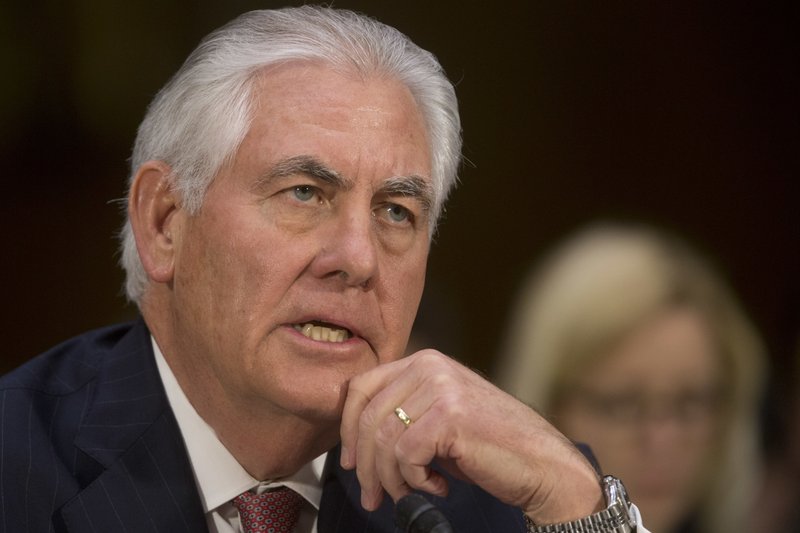
Seeking support from abroad, the U.S. struggled Monday to explain a hazy Syria strategy that has yet to clarify key questions: whether President Bashar Assad must go, how displaced Syrians will be protected and when America might feel compelled to take further action. Successive attempts by top Trump administration officials to articulate a plan have only furthered the appearance of a policy still evolving, even after the U.S. broke with precedent last week by attacking Assad’s forces. In the absence of answers, other countries seem to be moving ahead on their own terms. British Foreign Secretary Boris Johnson, after a meeting in Italy with U.S. Secretary of State Rex Tillerson, floated the possibility of new sanctions on both the Syrian and Russian militaries, an idea the U.S. has only briefly mentioned. In an unusual announcement for a foreign government, Johnson also said the U.S. could launch more cruise missiles into Syria like the ones President Donald Trump ordered last week in reaction to Assad’s use of chemical weapons. “Crucially, they could do so again,” Johnson said. Tillerson himself raised fresh expectations for aggressive U.S. action — and not only in Syria — as he visited Sant’Anna di Stazzema, a Tuscan village where the Nazis massacred more than 500 civilians during World War II. As he laid a wreath, he alluded to the Syria chemical attack. “We rededicate ourselves to holding to account any and all who commit crimes against the innocents anywhere in the world,” Tillerson said. Though such comments hint at a more activist U.S. foreign policy focused on preventing humanitarian atrocities, Trump has consistently suggested he prefers the opposite approach. His young administration has generally downplayed human rights concerns while promoting an “America First” strategy de-emphasizing the concerns of foreign nations. The uncertain view of U.S. objectives prevailed as Tillerson planned to attend a meeting Tuesday of the “likemindeds” — countries that share a similar approach to resolving Syria’s protracted civil war. The session on the sidelines of the Group of 7 summit in Italy was to include Middle East countries, including Turkey, Saudi Arabia, Jordan and the United Arab Emirates, that share a U.S. interest in resolving the conflict and resisting Iran’s influence in Syria. Tuesday night, Tillerson will fly to Moscow, the first official visit by a Trump Cabinet official to Russia, Assad’s strongest ally. The U.S. has said its Syria strategy centers on persuading President Vladimir Putin to stop supporting Assad. On Monday, the U.S. upped the stakes significantly by accusing Russia of knowing in advance of the chemical attack and using a Russian-operated drone to help cover it up. No component of Trump’s Syria policy has engendered more confusion than Assad’s future — an issue that similarly befuddled the Obama administration, whose once-adamant position that Assad must go softened substantially by the time President Barack Obama left office in January. Leading up to the U.S. missile attack, Trump’s administration had said Assad’s future was up to the Syrian people. Then Trump, the day after the assault, said his thinking about Assad had changed. Tillerson answered a question about effecting regime change by saying the U.S. was organizing a coalition to do just that. Yet after Trump’s retaliatory strike, the position became less clear. Some officials, like Tillerson, said the U.S. was confident Syrians would choose on their own to push Assad aside, while suggesting the U.S. wouldn’t mandate it. U.N. Ambassador Nikki Haley and others said ousting Assad was indeed a U.S. goal, but only one of several. Another unanswered question: Did Trump’s strike set a precedent that any chemical attack will trigger a U.S. response? At the White House, spokesman Sean Spicer insisted that Trump wouldn’t box himself in by disclosing his actions in advance. But he added further uncertainty to the equation by saying that even barrel bombs — which Assad has used with frequency — would necessitate U.S. action. “If you gas a baby, if you put a barrel bomb in to innocent people, I think you will see a response from this president,” Spicer said. Minutes later, the White House rushed to clarify that Spicer wasn’t announcing any new policy on barrel bombs. “Nothing has changed in our posture,” a White House official said in a written statement. On one point, the administration has been consistent: Defeating the Islamic State group in Syria is the first priority. There’s less certainty about what comes now. Tillerson and other officials have said the next priority is to create “zones of stability” in Syria where those displaced by civil war can live without fear of violence. They say that entails negotiating cease-fires between Assad’s government and rebels, who have been fighting both IS and Assad. With stability restored, they say, conditions will be ripe for a U.N.-brokered political transition. Yet it’s unclear why rebel groups would agree to cease-fires with Assad, who would protect the zones, and how. Assad’s willingness to clear the way for political talks predicated on him leaving power is deeply in question. Republished with permission of The Associated Press.
Marco Rubio says next step in Syria is negotiating regime change

Sen. Marco Rubio says the next step in Syria should be to work with Sunni governments to discuss “an alternative” government in Syria. Rubio is a Florida Republican and onetime rival of President Donald Trump. The conservative tells NBC’s “Today” show that Trump should reach out to Saudi Arabia and the United Arab Emirates, as well as Turkey, to discuss ways to get Syrian President Bashar Assad to step down and create a new regime. Assad has not responded to diplomatic pressure in the past, but Rubio says the military strikes could change that. He says, “We need to now move forward through a combination of diplomacy and, quite frankly, the support of groups on ground, particularly non-jihadist Sunni groups, to create alternatives to the Assad regime.” Republished with permission of The Associated Press.
Analysis: For Donald Trump, the weight of world’s problems sink in
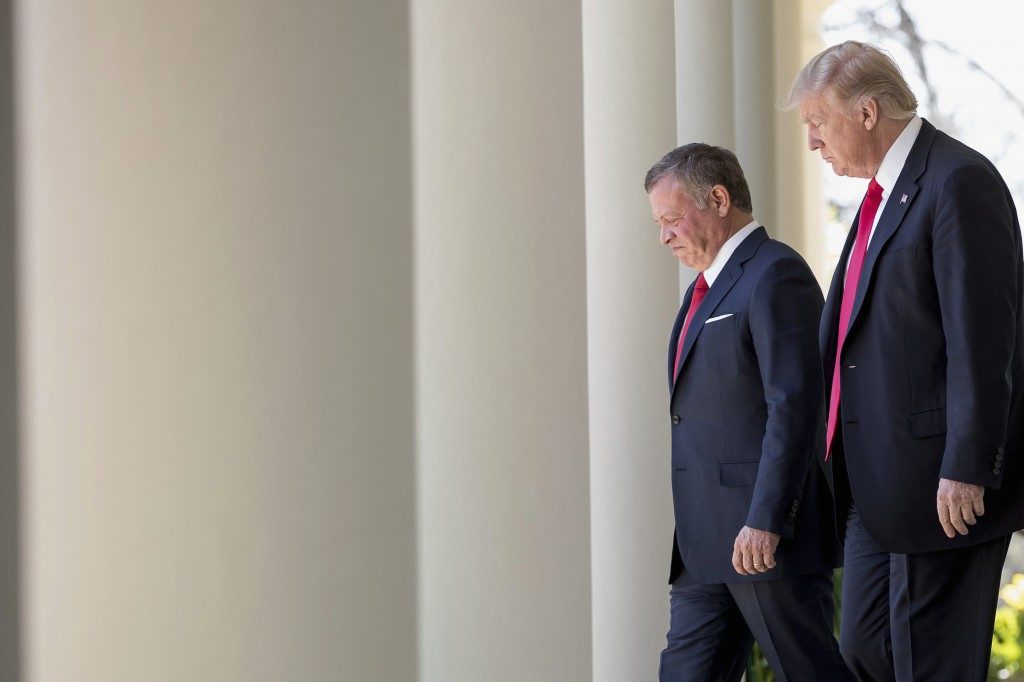
For Donald Trump, the reality of the world’s problems may be starting to sink in. Standing in the sunny White House Rose Garden, the president said Wednesday that the gruesome chemical weapons attack in Syria had changed his views on the quagmire of a conflict that he’d previously indicated he wanted to steer clear of. He mourned the deaths of the youngest victims — “innocent children, innocent babies” — and said brutality had “crossed a lot of lines for me.” “It is now my responsibility,” he declared. The president’s words were far from a declaration that he intends to act, and he notably avoided discussing what retaliatory options he would be willing to consider. Ultimately, his rhetoric may well land among the litany of harsh condemnations of Syrian President Bashar Assad by Barack Obama and other world leaders that did little to quell the six-year civil war. Yet Trump’s willingness to accept that he now bears some responsibility for a far-away conflict marked a significant moment for an “America First” president who has vowed to focus narrowly on U.S. interests. His comments also suggested a growing awareness that an American president — even an unconventional one like him — is looked to as defender of human rights and a barometer of when nations have violated international norms. The bloodshed in Syria is just one of the intractable international problems piling up around Trump. North Korea appears intent on building up its nuclear program, despite vague threats from his administration. The Islamic State group is still wreaking havoc in Iraq and Syria, while a Pentagon review of U.S. strategy sits on his desk. Trump conceded Wednesday that of all the world’s problems, the Middle East is one area he would rather avoid. His decision to at least rhetorically take a measure of responsibility was all the more striking given his frequent shoveling of blame for problems big and small onto anyone but himself. In public, he faults Obama for leaving him “a mess” and says his campaign opponent Hillary Clinton is behind the flood of revelations possibly linking his campaign to Russia. In private, he berates his staff for failing to fix the self-made crises that have battered the White House, including his pair of travel bans blocked by the courts and the failure to pass health care legislation. Trump initially took the same blame-shifting approach in addressing the deadly attack in Syria. In a short written statement Tuesday, he said the carnage was “a consequence of the past administration’s weakness and irresolution.” In 2013, Obama pulled back from planned airstrikes against Syria following a chemical weapons attack, despite having declared that the deployment of deadly gases would cross a “red line” for him. Obama’s decision was widely criticized in the U.S. and by Middle Eastern allies, and undermined later attempts to compel Assad to leave office. “The regrettable failure to take military action in 2013 to prevent Assad’s use of chemical weapons remains a blight on the Western world,” said Sen. Bob Corker, R-Tenn., the chairman of the Senate Foreign Relations Committee. Still, foreign policy officials within the Trump administration were irritated by the president’s eagerness to focus on his predecessor in his first reaction. Some wanted him to focus more on condemning Assad and highlighting U.S. resolve. Their objections did little to sway the president at the time. But just a day later, Trump appeared more willing to embrace the gravity of the situation and his new role in it. His posture may well have been impacted by the fact that his remarks in the Rose Garden came after meeting with Jordan’s King Abdullah, whose country has borne the brunt of the refugee crisis spurred by the Syrian war. Jordan is among Washington’s most important partners in the region and is significantly dependent on the United States. Abdullah, who worked closely with Obama, enthusiastically embraced Trump’s condemnation of the chemical weapons attack. During a joint news conference, he said to Trump, “I believe under your leadership we will be able to unravel this very complicated situation.” Eliot Cohen, a Trump critic who served in the State Department under President George W. Bush, said that whether Trump intended to or not, he now has put himself in the same position as Obama, raising the stakes for action in Syria, perhaps without having thought out whether he plans to follow through. “The deep irony here is you may see a lot of the same failures that the Obama administration had except delivered with a different style,” Cohen said. Republished with permission of The Associated Press.
Year’s top news filled with division — and no middle ground

Fed up with Europe’s union across borders? Reject it. Disgusted with the U.S. political establishment? Can it. The news in 2016 was filled with battles over culture and territory that exposed divisions far deeper than many realized. But people confronting those divides repeatedly rejected the prospect of middle-ground solutions and the institutions put in place to deliver them. While the headlines told many different stories, the thread connecting much of the news was a decisive torching of moderation, no matter how uncertain the consequences. “You’re not laughing now, are you?” Nigel Farage, a leader of the Brexit campaign, told the European Parliament after voters in Great Britain spurned membership in the continental union. “What the little people did … was they rejected the multinationals, they rejected the merchant banks, they rejected big politics and they said, ‘Actually, we want our country back.’” Farage was speaking only about the United Kingdom. But his observation that many people well beyond Britain shared that disdain for working within the system was borne out repeatedly in the year’s biggest headlines. In a U.S. presidential campaign fueled by anger and insults, in Syria’s brutal war and Venezuela’s massive protests, in fights over gay rights and migration, opposing sides rejected not just compromise but also the politics of trying to forge it. That was clear from the year’s first days, when armed activists took over a national wildlife refuge in Oregon’s high desert, opposing the federal government’s control of public lands. “It needs to be very clear that these buildings will never, ever return to the federal government,” LaVoy Finicum, an Arizona rancher among the activists, told reporters. Weeks later, federal agents stopped vehicles outside the refuge, arresting eight of the activists and fatally shooting Finicum when he reached into a jacket that held a loaded gun. Even in the rare cases when compromise prevailed, it was viewed with suspicion. When a deal took effect in January limiting Iran’s nuclear program in exchange for relief on sanctions, it marked the culmination of prolonged negotiation by President Barack Obama‘s administration. But the pact was repeatedly attacked by critics in both countries, including Donald Trump, saying it gave the other side too much. “The wisest plan of crazy Trump is tearing up the nuclear deal,” a leading Iranian hard-liner, Hossein Shariatmadari, told his country’s news agency. In mid-February, U.S. Supreme Court Justice Antonin Scalia died in his sleep, leaving a vacuum on a court where he had long been the leading conservative voice. Barely an hour after Scalia’s death was confirmed, Senate Majority Leader Mitch McConnell staked out an uncompromising position on what lay ahead. “The American people should have a voice in the selection of their next Supreme Court justice,” McConnell said, disregarding the fact that U.S. voters had twice elected Obama. “Therefore, this vacancy should not be filled until we have a new president.” North Carolina lawmakers prompted protests and counterprotests when they rushed through House Bill 2, voiding local gay-rights ordinances and limiting bathroom access for transgender people. Companies, the NBA and others followed through on threats to move jobs, games and performances out of the state, amplifying the division. Tensions over U.S. policing bled into a third year. In July, a sniper killed five Dallas police officers during a protest over shootings of black men by police in Louisiana and Minnesota. A South Carolina jury failed to reach a verdict in the trial of a white officer caught on video fatally shooting a black man fleeing a traffic stop. Division, though, was hardly limited to the U.S. In Venezuela, triple-digit inflation and shortages of food and medicine fueled 6,000 protests throughout the year that brought millions into the streets. But the government of President Nicolas Maduro, blamed by many voters for the chaos, blocked a recall campaign. “If you’re going to shoot me because I’m hungry, shoot me!” a young man shouted at a soldier during one protest in Caracas. In Colombia, voters narrowly rejected a deal between the government and a guerrilla group to end a 52-year civil war. Even when lawmakers approved a renegotiated deal, the peace remained fragile. In Brazil, senators impeached President Dilma Rousseff for manipulating budget figures, though many of the lawmakers were, themselves, tarred by accusations of corruption. South Korean President Park Geun-hye was stripped of power in December amid allegations she let a close friend use the government for financial gain. Meanwhile, Syria’s war entered its sixth year. But despite pressure by the U.S. and its allies, Russia and the government of President Bashar Assad unleashed an assault on Aleppo to wipe out rebels, driving up the toll in a conflict that has already claimed as many as 500,000 lives. “This is a targeted strategy to terrorize civilians and to kill anybody and everybody who is in the way of their military objectives,” U.S. Secretary of State John Kerry said, accusing Syria and Russia of war crimes. “As long as war crimes are at question,” a Russian government spokeswoman said, “the Americans should start with Iraq.” In Yemen, cease-fires broke down, extending a nearly two-year civil war. But with Syria capturing most international attention, a famine resulting from the turmoil was mostly overlooked. As the fighting continued, terrorist strikes spread fear well beyond the Middle East. A bombing at a Brussels airport in March and another attack in June at Istanbul’s airport by gunmen with explosives killed a total of nearly 80 people. More than 70 died when a bomb went off in a park in Pakistan, with a faction of the Pakistani Taliban claiming responsibility. In July, a terrorist drove a truck into a Bastille Day crowd in Nice, France, killing 86 and injuring more than 400 others. The Islamic State group claimed responsibility. In June, security guard Omar Mateen opened fire inside a gay nightclub in Orlando, Florida, in the deadliest mass shooting ever in the U.S. In a call to police during the attack, which killed 49, Mateen — a U.S. citizen born
U.S. election voted top news story of 2016
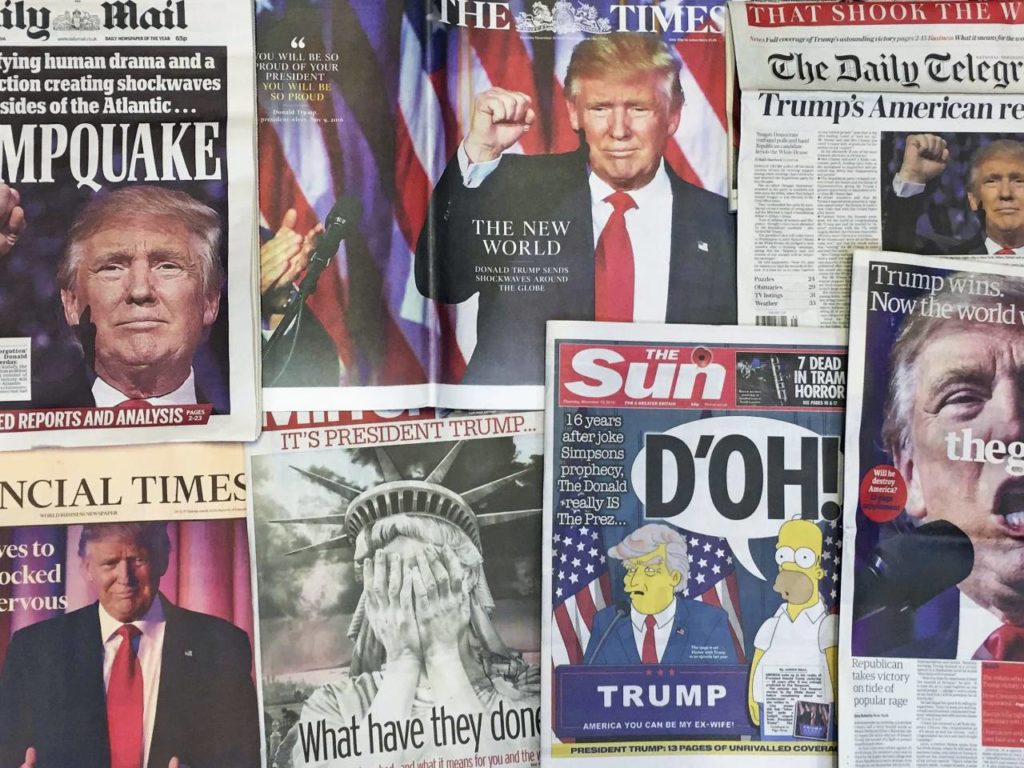
The turbulent U.S. election, featuring Donald Trump‘s unexpected victory over Hillary Clinton in the presidential race, was the overwhelming pick for the top news story of 2016, according to The Associated Press’ annual poll of U.S. editors and news directors. The No. 2 story also was a dramatic upset — Britons’ vote to leave the European Union. Most of the other stories among the Top 10 reflected a year marked by political upheaval, terror attacks and racial divisions. Last year, developments related to the Islamic State group were voted as the top story — the far-flung attacks claimed by the group, and the intensifying global effort to crush it. The first AP top-stories poll was conducted in 1936, when editors chose the abdication of Britain’s King Edward VIII. Here are 2016’s top 10 stories, in order: 1. US ELECTION: This year’s top story traces back to June 2015, when Donald Trump descended an escalator in Trump Tower, his bastion in New York City, to announce he would run for president. Widely viewed as a long shot, with an unconventional campaign featuring raucous rallies and pugnacious tweets, he outlasted 16 Republican rivals. Among the Democrats, Hillary Clinton beat back an unexpectedly strong challenge from Bernie Sanders, and won the popular vote over Trump. But he won key Rust Belt states to get the most electoral votes, and will enter the White House with Republicans maintaining control of both houses of Congress. 2. BREXIT: Confounding pollsters and oddsmakers, Britons voted in June to leave the European Union, triggering financial and political upheaval. David Cameron resigned as prime minister soon after the vote, leaving the task of negotiating an exit to a reshaped Conservative government led by Theresa May. Under a tentative timetable, final details of the withdrawal might not be known until the spring of 2019. 3. BLACKS KILLED BY POLICE: One day apart, police in Baton Rouge, Louisiana, fatally shot Alton Sterling after pinning him to the ground, and a white police officer shot and killed Philando Castile during a traffic stop in a suburb of Minneapolis. Coming after several similar cases in recent years, the killings rekindled debate over policing practices and the Black Lives Matter movement. 4. PULSE NIGHTCLUB MASSACRE: The worst mass shooting in modern U.S. history unfolded on Latin Night at the Pulse, a gay nightclub in Orlando. The gunman, Omar Mateen, killed 49 people over the course of three hours before dying in a shootout with SWAT team members. During the standoff, he pledged allegiance to the Islamic State. 5. WORLDWIDE TERROR ATTACKS: Across the globe, extremist attacks flared at a relentless pace throughout the year. Among the many high-profile attacks were those that targeted airports in Brussels and Istanbul, a park teeming with families and children in Pakistan, and the seafront boulevard in Nice, France, where 86 people were killed when a truck plowed through a Bastille Day celebration. In Iraq alone, many hundreds of civilians were killed in repeated bombings. 6. ATTACKS ON POLICE: Ambushes and targeted attacks on police officers in the U.S. claimed at least 20 lives. The victims included five officers in Dallas working to keep the peace at a protest over the fatal police shootings of black men in Minnesota and Louisiana. Ten days after that attack, a man killed three officers in Baton Rouge, Louisiana. In Iowa, two policemen were fatally shot in separate ambush-style attacks while sitting in their patrol cars. 7. DEMOCRATIC PARTY EMAIL LEAKS: Hacked emails, disclosed by WikiLeaks, revealed at-times embarrassing details from Democratic Party operatives in the run-up to Election Day, leading to the resignation of Democratic National Committee chair Debbie Wasserman Schultz and other DNC officials. The CIA later concluded that Russia was behind the DNC hacking in a bid to boost Donald Trump’s chances of beating Hillary Clinton. 8. SYRIA: Repeated cease-fire negotiations failed to halt relentless warfare among multiple factions. With Russia’s help, the government forces of President Bashar Assad finally seized rebel-held portions of the city of Aleppo, at a huge cost in terms of deaths and destruction. 9. SUPREME COURT: After Justice Antonin Scalia‘s death in February, President Obama nominated Merrick Garland, chief judge of the U.S. Court of Appeals, to fill the vacancy. However, majority Republicans in the Senate refused to consider the nomination, opting to leave the seat vacant so it could be filled by the winner of the presidential election. Donald Trump has promised to appoint a conservative in the mold of Scalia. 10. HILLARY CLINTON’S EMAILS: Amid the presidential campaign, the FBI conducted an investigation into Clinton’s use of a private computer server to handle emails she sent and received as secretary of state. FBI Director James Comey criticized Clinton for carelessness but said the bureau would not recommend criminal charges. Stories that did not make the top 10 included Europe’s migrant crisis, the death of longtime Cuban leader Fidel Castro, and the spread of the Zika virus across Latin America and the Caribbean. Republished with permission of The Associated Press.
Jeb Bush: Donald Trump “scary,” too “uninformed” to be president
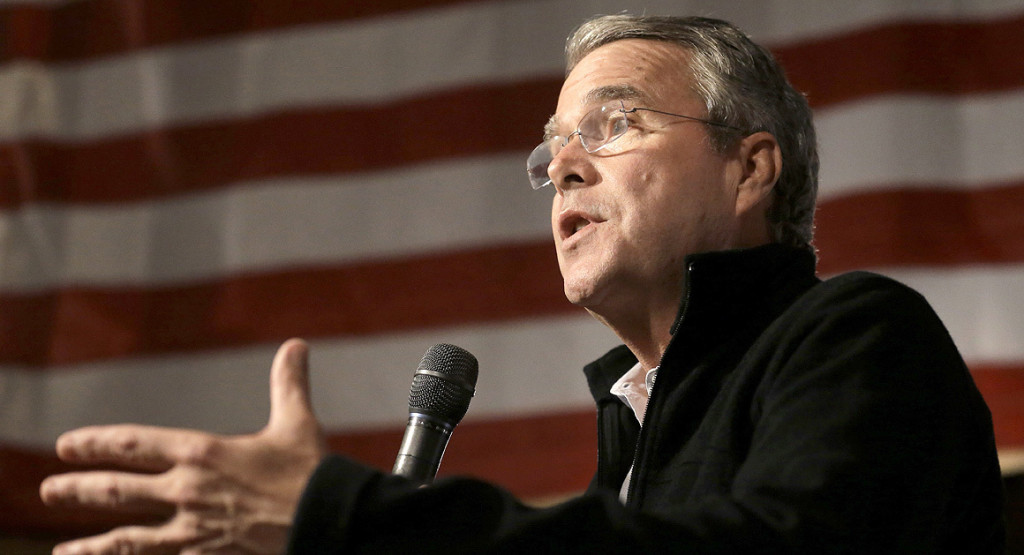
Jeb Bush once again criticized rival presidential candidate Donald Trump, calling the Republican front-runner “scary” and suggested was too “uninformed” to lead the nation. Louis Nelson of POLITICO reports that Bush, in an interview on CBS’s “Face the Nation,” blasted the billionaire real estate tycoon for changing positions on Syrian refugees and how to fight the Islamic State, also known as ISIS. “The simple fact is that he’s been wrong on Syria and on the refugees pretty consistently,” Bush said. “And no one’s holding him to account. He first said we had no interest in being involved in Syria. And then he said let the Russians take out ISIS. And then he said let ISIS take out [Syrian President Bashar] Assad.” “Back and forth it goes,” Bush continued. “And the net effect of this is in these really serious times he’s not a serious leader.” Bush did offer words of praise for Trump’s media strategy, which he said plays reporters “like a fiddle,” with outrageous statements engineered to gain attention. Although Bush said he would support the eventual GOP nominee, the former governor did insist that Trump’s attraction will begin to fade. “Anybody is better than Hillary Clinton,” Bush said. “Let me just be clear about that … But I have great doubts about Donald Trump’s ability to be commander in chief. I really do.” Bush added that he will give Trump “the benefit of the doubt” to see how his campaign progresses. “But if you listen to him talk,” he said, “it’s kind of scary to be honest with you because he’s not a serious candidate.” Trump is “all over the map,” at best misinformed, and at worst playing on people’s fears. Eventually, it will be the voters who decide about Trump, Bush noted. “I’m pretty confident that the more they hear of him, the less likely he’s going to get the Republican nomination.”
Marco Rubio seeks aggressive approach to Russia
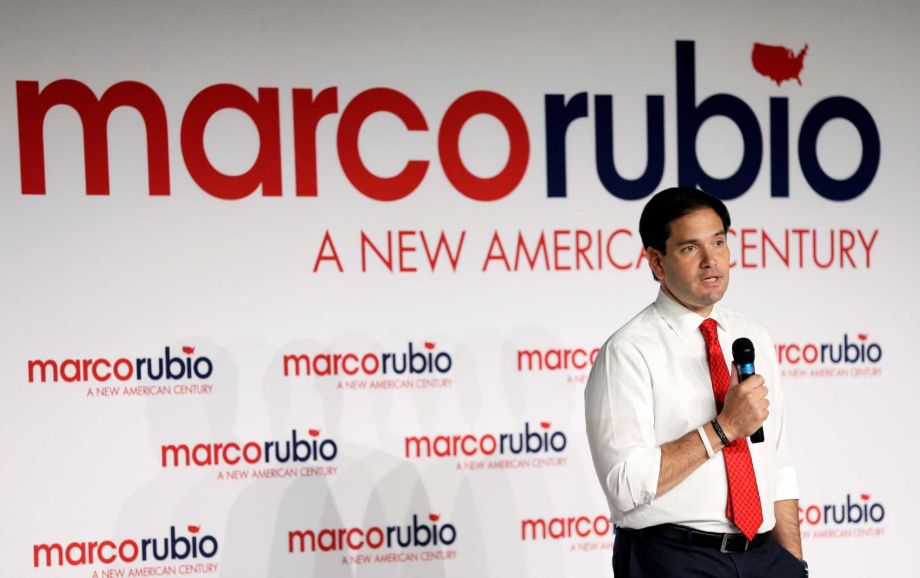
Republican presidential candidate Marco Rubio called for a more aggressive approach to Russia on Friday, including new sanctions against major officials and companies. During an appearance at a national security forum in Iowa, the Florida senator called Russian President Vladimir Putin a “gangster and a thug,” adding “I stand by that phrasing.” Rubio said if he’s elected, he’ll seek additional visa bans and asset freezes, provide more assistance to Ukraine and limit diplomatic engagement with Moscow “on issues not essential to resolving the crisis in Ukraine.” “We are barreling toward a second Cold War,” Rubio said. “The more our current president fails the test of leadership against Putin, the more important it becomes for our next president to pass it. And I will pass that test if I am given that opportunity.” Russia began airstrikes in Syria this week. While Moscow officials maintain that they are targeting Islamic State groups and other extremists, U.S. authorities have questioned that, noting the areas hit were strongholds of rebels seeking to oust Syrian President Bashar Assad. Rubio has been campaigning more in Iowa recently as he rises in the GOP polls and has picked up support following Wisconsin Gov. Scott Walker‘s exit from the race. During the forum, he said that Islamic State militants in Syria should be defeated by Sunnis “on the ground,” with aviation and special forces support from the United States. On the flood of refugees from Syria, he said it would not be easy for the United States to conduct background checks on the refugees and said a better approach would be to create a “safe zone” in Syria where they can go. “It isn’t good for anyone … these dangerous journeys that they’re making into Europe,” Rubio said. Rubio — who is seeking to boost the United States’ military presence around the world — also said that defense spending was not the reason for federal debt, arguing instead in favor of overhauling entitlement programs. A spokesman for the Iowa Democratic Party questioned Rubio’s foreign policy work in Congress, noting he has missed recent votes on related issues. In an email, Sam Lau said: “Marco Rubio believes he can ignore his national security commitments in the U.S. Senate and then lecture to Iowans about the issue.” Rubio, who has one of the worst voting records this year in the Senate, has acknowledged missing some votes but said on ABC’s “This Week” recently that he has “tried very hard to be there as much as possible.” He also argued that voting is only part of his job, noting that he attends committee hearings and that his office provides an array of services for his Florida constituents. Republished with permission of the Associated Press.


